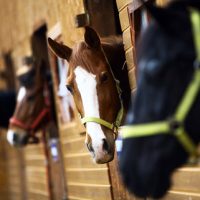Horse And Equine Activity Accident Liability

In many parts of Tennessee, horses and horseback riding is a way of life. Horses help work farms, and the Tennessee economy by helping farmers work their fields. They provide transportation in areas that cars cannot go. They are competitive, with equestrian competitions, or polo meets, and provide tourism dollars to the state, as visitors come and ride them.
Natural Unpredictability
But they are also wild animals, and that means unpredictability. Certainly, horses are generally docile and domesticated animals—liability for actual horse attacks are rare. What is more common are accidents that are no fault of the animal itself.
Horses can buck, step in potholes, make sharp turns, and make other sudden movements that can easily throw somebody off of them. Horses are also quite high off the ground; riders are many feet above ground, often bound by their feet, which means that when they fall, they often fall head first. This can cause devastating paralysis injuries, such as the accident suffered by popular actor Christopher Reeve.
Liability for Equine Event Accidents
As a general rule, businesses and professionals are not liable for horseback riding injuries that are inherent in the activity, or which may be inherent in any equine sporting event. The law defines inherent as anything that relates to the natural unpredictability of horses, collisions with other horses or objects, or accidents that may result from the conditions of the surface the horse is walking on.
The protections are quite broad; immunity from liability (meaning protection from being sued for injuries) extends to any company that rents horses to others for sport, leisure, work or training. It extends to companies that board horses, conduct fairs or festivals, use horses for things like polo events, or the process of inspecting a horse. The immunity applies whether the victim paid to use the horse or not.
When Can Someone be Held Liable?
However, this doesn’t mean that you can never sue a company or owner for injuries on a horse—you can. If the company or person that owns the horse knew of a dangerous condition that you would not have known about, or knows about some kind of dangerous propensity of a given horse that you could not have known about, the owner or business that owns the horse, can be liable for your injuries.
Owners of horses or businesses that conduct horse or equine activities can’t do anything that is blatantly reckless, or which shows a callous disregard for safety.
Equine professionals are also held to a higher standard of care. That means that they can’t just do what a reasonable person must do—they must act in accordance with the special training and knowledge that someone trained in working with horses would act. This makes it easier to hold horse owners or businesses liable, so long as the law allows it.
Call the Knoxville product liability lawyers at Fox Farley Willis & Burnette, PLLC, today if you were injured on a horse or at any type of equestrian related event.
Sources:
animallaw.info/statute/tn-equine-activity-liability-chapter-20-equine-activities-liability#:~:text=Under%20Tennessee%20Law%2C%20an%20equine,%2C%20title%2044%2C%20chapter%2020.
riders4helmets.com/2011/02/equestrian-sport-statistics-facts-what-you-should-know/
